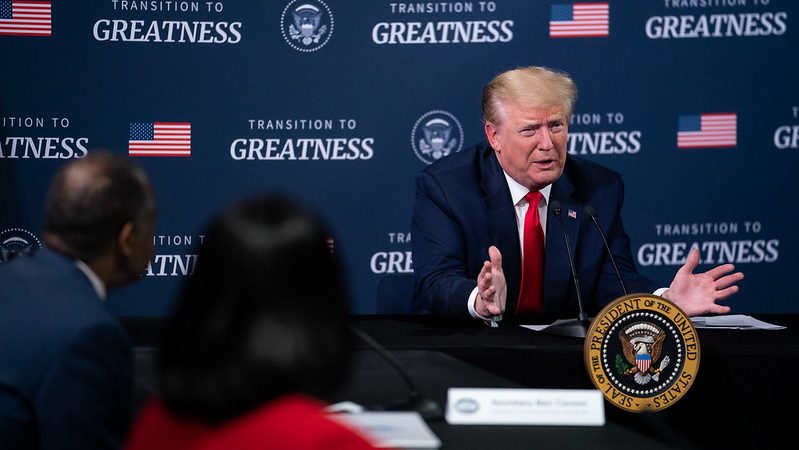Among Catholics overall, Biden — himself a Catholic — fought Trump to a stalemate
Study: Trump expanded evangelical support in 2020, but Biden gained with other white Christians

WASHINGTON, July 2, 2021 (RNS) — A new survey reports former President Donald Trump expanded his robust support among white evangelicals in the 2020 election, but President Joe Biden won in part by making significant gains among Catholics and non-evangelical Protestants.
That’s according to Pew Research’s new “Behind Biden’s 2020 Victory” study unveiled on Wednesday (June 30). The findings, based on a survey of people confirmed by public records to have voted in 2020, showed that Trump was supported by 84% of white evangelicals in 2020, an increase of 7 percentage points over the 77% of white evangelicals who voted for him in 2016.
Trump, who launched his “Evangelicals for Trump” initiative in January 2020 at a mostly Spanish-speaking church in Florida, also slightly increased his support among Protestant Christians overall, expanding his margin from 56% in 2016 to 59% last year.
But there is evidence Biden, who also ran an expansive faith outreach program during his campaign, chipped away at Trump’s religious coalition by making up ground with other faith groups.
RELATED: Joe Biden, president-elect at last, was shaped by a very American Catholic faith
Among Catholics overall, Biden — himself a Catholic — fought Trump to a stalemate. After Catholics backed Trump (52%) over Hillary Clinton (44%) in 2016, Biden managed to reduce the spread to a statistical tie, with 49% supporting him compared to 50% who said they voted for Trump.
Pew did not provide data to compare Hispanic Catholic votes in 2016 to 2020, but there are indications Biden courted favor among his fellow white Catholics — a powerful voting bloc in Rust Belt swing states. Whereas 31% said they voted for Clinton in 2016, 42% cast their ballots for Biden in 2020. Trump won the demographic in both elections (64% in 2016 and 57% in 2020), but a shift toward Biden cut the former president’s winning margin with the group by more than half.
There was also a notable — albeit less dramatic — movement among white, non-evangelical Protestants. Only 37% of the group supported Clinton in 2016, with Trump securing 57% of their vote that year. Trump won the same percentage last November, but Biden managed to convince 43% of the group to back his campaign.
The shifts echo longstanding warnings from scholars and activists who pointed to cracks in Trump’s support among white Catholics and white non-evangelical Protestants as early as May 2019. At the time, experts noted Trump’s favorability ratings were far more elastic with those groups than among white evangelicals, a reliable base for him even amid various scandals.
Pew’s findings may also vindicate Democratic strategists who insisted on robust faith outreach efforts in the 2020 campaign. In addition to working to compile endorsements from faith leaders and dedicating an entire section of the 2020 Democratic National Convention to a discussion of his faith, Biden repeatedly invoked his Catholicism while on the campaign trail and spoke at various religious gatherings. In addition, both the DNC and the Biden campaign produced ads for television and digital platforms targeted at Catholic voters.
RELATED: Biden campaign launches a trio of new faith ads targeted at evangelical and Catholic voters
Biden also organized aggressive outreach to Black Protestants throughout his campaign and secured support from 91% of the demographic by Election Day in 2020, according to Pew. The reports did not provide 2016 data on the group for comparison.
Researchers noted Biden also expanded Democratic support among a rapidly expanding subset of the American religious landscape: people who claim no religious affiliation whatsoever.
The group has long skewed heavily liberal, with Clinton winning 65% of their votes compared to Trump’s 24% in 2016. Trump fared slightly better with the group last year (26%), but Biden boasted 71%, drawing on heavy support from subsets such as atheists (87%) and agnostics (84%).
However, Trump appears to have made unexpected gains with another unaffiliated subset — namely, people who answer questions about religious affiliation by selecting “nothing in particular.” Biden won the same percentage of the group as Clinton (61%), but Trump increased his support from 27% in 2016 to 35% in 2020.
Read more news at XPian News… https://xpian.news




Comments are Closed